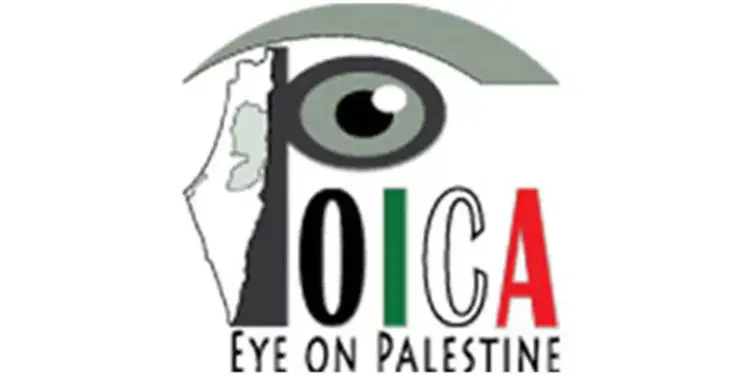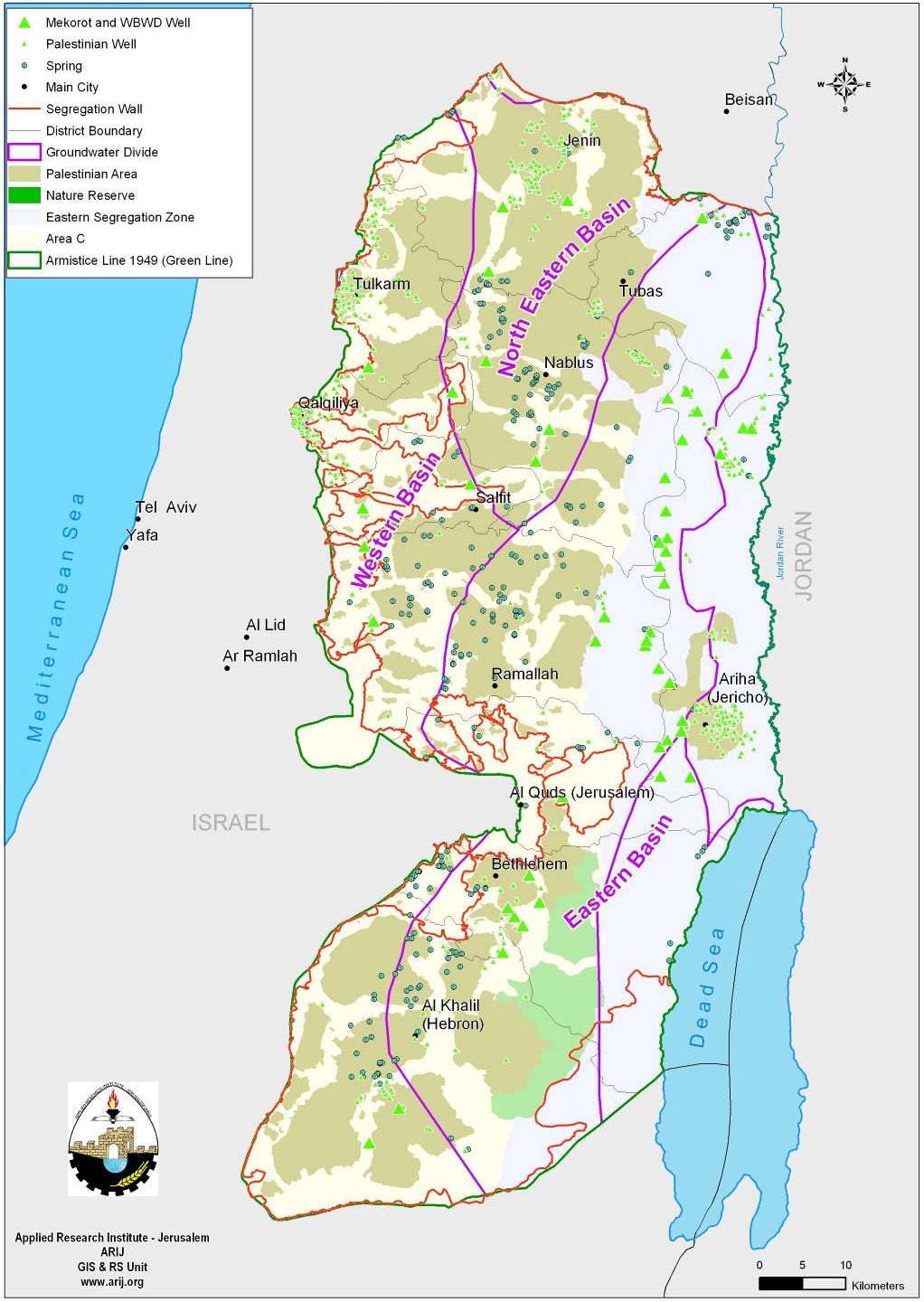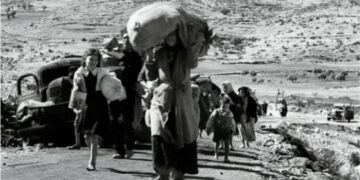Background
Water is a key resource for sustaining human life and access to safe water has been declared a fundamental human right by former UN Secretary-General Kofi Annan. International law limits the rights of any occupying power to utilize the water resources of an occupied territory (Article 55- Hague regulations; B’tselem), and prohibits an occupying power from discriminating between residents of an occupied territory (Article 27 of the Fourth Geneva Convention). Israel, as an internationally recognized occupying power, has illegally annexed water resources from the Palestinian territories since the occupation of 1967, creating a centralized water system over which it exercises full control. Israel also employs a highly discriminatory policy of water distribution, contributing to daily hardship for Palestinian urban and agricultural communities. Earlier this year President Abbas expressed his disappointment with Israeli water policies which continue to restrict Palestinian development and severely curtail living standards. Illegal Israeli settlements in the occupied territories consume vast amounts of water which divert resources for use in Palestinian communities. Settlements are also located in strategic positions which ensure Israeli access to water.
Water Crisis
Water security is a major concern for both Palestinians and Israelis. In 1967, before the 6 day war, Israeli Prime Minister Levi Eshkol noted that water was a question of survival for Israel and that Israel would use all means necessary to secure water resources. The principal water resources are the West Bank aquifer system, the Jordan River system and the Coastal aquifer. In 1967, the Israeli military order 92 transferred all powers over water to the occupation authorities, which were subsequently transferred to the Israeli water company Mekorot in 1979. The Israeli occupation denied permits to Palestinians for drilling for new wells and set quotas on water extraction that were severely below basic needs. Indeed, Palestinian consumption of water on a per capita basis is more than 4 times less than that of Israeli’s and less than the World Health Organization’s minimum recommended guidelines. This is not due to a shortage of water per se, but is a consequence of discriminatory Israeli water policies and lack of investment in infrastructure for Palestinians. Presently, 80% of Palestinian water from the West Bank’s Aquifer is used by Israel (ARIJ), and a large percentage of water from the sources annexed in 1967, above all the Eastern Aquifer in the West Bank, were used to benefit settlements in the area. Water shortages, contamination and lack of infrastructure have dire consequences for development and 215,000 Palestinians live in communities with no running water, roughly 10% of the population.
Settlements and Water
There is a direct connection between water shortages for Palestinians and the development of settlements in the West Bank, indeed the establishment of settlements would not be possible without manipulating water resources. Mekorot, Israel’s national water company, also benefits enormously from this relationship. For example, the average per-capita Palestinian water consumption for all sectors is 107-156 cubic meters per year, whereas a Jewish settler uses 650-1,714 cubic meters per year, 6-10 times more. Nearly 40% of water supplied to West Bank governorates is purchased directly from Mekorot at inflated prices, meaning that Palestinian water supplies which were stolen by Israel are now being sold back to Palestinians, resulting in huge profits for Mekorot. Indeed 56% of water for urban use in the West Bank is supplied by Israeli authorities (B’tselem). The settlers, whose consumption rates are higher, obtain water supplies which are heavily subsidized by the Israeli state. From a simple business perspective, the high prices paid by Palestinians seem to contribute to the subsidized cost of water for settlers, who are illegally in Palestine and illegally benefit from an unequal distribution of water.
Settlements, for example, receive a continuous supply of water all year round, even in the summer months when water is scarce. The demand for water in settlements means that water supplies to Palestinian areas are drastically reduced, and a senior official of the Water Commission told B’tselem that; ‘Mekorot's obligation is, first of all, to the Jewish settlements and Israeli citizens’. For example, in June, July and August Mekorot cut water supplies from 5,000 cubic meters a day to 2,500 cubic meters a day in the Hebron municipality as increased demand from settlements meant their needs were prioritized over those of Palestinians. In Bethlehem also, Mekorot supplies 10,000 cubic meters per day but during the summer months reduces this amount to 6,000 cubic meters per day. There is no decrease in water supplies to Jewish settlements over the same period and the continued supply of water to settlements is a direct consequence of cutting water supplies to Palestinian areas.
In addition to urban areas, agricultural settlements benefit greatly from Israel’s illegal and racist distribution of water. Agrexco, an Israeli Agricultural company, has stated that it markets and sells 60-70% of all produce grown in the Jordan valley and operates on a large scale with the settlements of Tomer, Mehola, Hamra, Ro’I, Massu’a, Mekhora, Netiv Ha-Gdud and Bet HA-Arava. Whilst local Palestinian farmers struggle to cultivate crops due to a lack of water, Israeli companies and settlements in the Jordan Valley are able to operate solely because of the biased way in which water is distributed to them. This has a detrimental affect on Palestinian agriculture. Whereas agriculture in the occupied territories employs 14% of the labor force, in Israel it employs only 2% (B’tselem), yet Israeli companies and settlements receive a disproportionate percentage of water supplies. The village of Faqqu’a in Israeli controlled Area C is another example of this racist agricultural policy. Whereas the land of farmers in Faqqu’a is barren for lack of water, land across the border in Israel is green and productive, meaning that despite sharing the same source of water, racist Israeli policies prevent Palestinian agriculture from flourishing. See Map 1
Map 1: Well Areas and Aquifer Basins
The annexation of water resources and settlement activity are inextricably connected in both urban and agricultural areas. This is one of the benefits of the occupation for Israel. The location of settlements and the subsequent infrastructure built around them serve to annex water supplies to Israel. For example, some of the largest settlements, Ariel and Qedumin, are built over the Western basin aquifer and are surrounded by the separation wall, annexing water resources to Israel. Even if the wall was not there, Mekorot still controls where and to whom water is supplied. Placing settlements on hilltops over aquifers ensures Palestinians can not drill wells to obtain water. It is estimated that 50 groundwater wells and 200 cisterns have been destroyed due to the separation wall, meaning land that could potentially produce agricultural goods is made redundant. Settlements form a core element in this policy as many wells are located in the settlements themselves, meaning settlers have control over water resources and water is often diverted from Palestinian households and farmers.
In many cases, extensive lawns, gardens and swimming pools within settlements benefit from access to this water, even though they serve no developmental purpose and are purely ornamental. This is in direct contrast to surrounding Palestinian communities who require water for drinking, cultivating crops, cleaning and personal hygiene, yet are denied access to it. The annexation of water from Palestinian communities is therefore one way in which settlements limit the developmental process in the West Bank, this in addition to the huge profits made by Israeli water and agricultural companies who benefit from a monopoly over water access.
Prepared by:
The Applied Research Institute – Jerusalem













